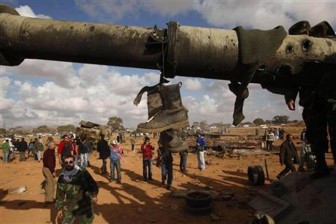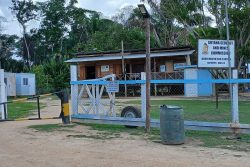TRIPOLI, (Reuters) – Western powers pressed ahead yesterday with a campaign of air attacks in Libya, promising more strikes despite criticism by the Arab League.

U.S. military officials said Saturday’s strikes had halted an advance by Muammar Gaddafi’s forces on the eastern rebel stronghold Benghazi and hit his air defences, allowing western powers to send in planes to impose a no-fly zone.
But the day-old U.N.-mandated military intervention to force Gaddafi’s troops to end attacks on civilians hit a diplomatic setback when the Arab League chief questioned the bombardment.
“What is happening in Libya differs from the aim of imposing a no-fly zone, and what we want is the protection of civilians and not the bombardment of more civilians,” Egypt’s state news agency quoted Arab League Secretary-General Amr Moussa as saying.
Gaddafi himself said the air strikes amounted to terrorism and vowed to fight to the death, although at 9 p.m. (1900 GMT) yesterday an armed forces spokesman said the army was ordering all troops to cease fire immediately.
The United States and Britain, who along with France, Italy and Canada have joined operation “Odyssey Dawn”, dismissed the ceasefire announcement, arguing that Gaddafi’s government had promised and then broken a ceasefire on Friday.
In central Benghazi, sporadic explosions and heavy firing could be heard in the streets late in the evening. A Reuters witness said the firing lasted about 40 minutes.
Residents had said they feared some of Gaddafi’s troops could try to force their way into the city, where they would be surrounded by civilians and protected from attacks from the air.
Outside Benghazi, the advance by Gaddafi’s troops was stopped in its tracks, with smouldering, shattered tanks and troop carriers littering the main road. The charred bodies of at least 14 government soldiers lay scattered in the desert.
However, government tanks did move into Misrata, the last rebel-held city in western Libya, seeking the shelter of built-up areas after a base used by Gaddafi’s forces outside was hit by Western air strikes, residents said.
Abdelbasset, a spokesman for the rebels in Misrata, told Reuters: “There is fighting between the rebels and Gaddafi’s forces. Their tanks are in the centre of Misrata … There are so many casualties we cannot count them.”
CIVILIAN
CASUALTIES
A Libyan government health official said 64 people had been killed in the Western bombardment overnight from Saturday to yesterday, but it was impossible to verify the report.
The Arab League’s Moussa called for an emergency meeting of the group of 22 states to discuss Libya. He requested a report into the bombardment, which he said had “led to the deaths and injuries of many Libyan civilians”.Arab backing for a no-fly zone provided crucial underpinning for the passage of a U.N. Security Council resolution last week that paved the way for Western action to stop Gaddafi killing civilians as he fights an uprising against his rule.
The intervention is the biggest against an Arab country since the 2003 invasion of Iraq. Withdrawal of Arab support would make it much harder to pursue what some defence analysts say could in any case be a difficult, open-ended campaign with an uncertain outcome.
Britain and the United States rebuffed Moussa’s comments.
A senior U.S. official said a U.N. resolution endorsed by Arab states covered “all necessary measures” to protect civilians, “which we made very clear includes, but goes beyond, a no-fly zone”.
The safe enforcement of the no-fly zone required the targeting of Libya’s air defence capabilities, a British Foreign Ministry spokesman said.








